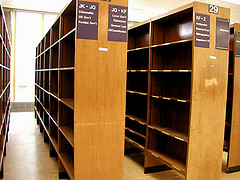 Although the new library building opening in 2012 will not be a space for books, the Brody Learning Commons is already impacting the uses of the “old” library building. Our offsite facility (the Libraries Service Center) is about 15 years old and so much of our collection is now “out there” that we are attempting to come to terms with just what should be in good old MSEL.
Although the new library building opening in 2012 will not be a space for books, the Brody Learning Commons is already impacting the uses of the “old” library building. Our offsite facility (the Libraries Service Center) is about 15 years old and so much of our collection is now “out there” that we are attempting to come to terms with just what should be in good old MSEL.
The whole question of books in libraries is a complex and increasingly controversial one. Almost every week it seems, some library or another announces that it’s getting rid of all its books, or moving them all to storage. Everything is online after all, isn’t it? The latest to follow this trend is Stanford’s engineering library. There’s also Cornell’s engineering library and Cushing Academy in Massachusetts; even our own Welch Medical Library is emphasizing online resources and moving most of their books. The “bookless library” – hmmm.
We are not looking to jettison our books just yet! But we are trying to decide exactly what books are needed on campus, in the library. Those of us in the humanities are used to the practice of browsing the stacks, to discover things serendipitously. Is this still a 21st century research strategy, or a myth?
We’d be pleased to hear from you, our patrons. What kinds of books do you need in the library? Contact your Subject Librarian, reply to this post, or, here’s a revolutionary idea – come into the library! Let’s talk about it.

Books still are the cheapest way to store information in a stable form for hundreds of years. The question becomes where to store them, as you indicate. I would love to see all of the journals in MSEL go to LSC and to be digitized. What I like to have at hand in MSEL are specialized dictionaries, indexes, catalogues, surveys and introductions to subjects, etc. The physical library should help me get into a topic, while I can always get a special monograph from the LSC. It is nice to be able to retrieve articles online, but searching a raft of online databases with their different interfaces can be a pain.
Basically, things which aren’t online should be as available as much as possible. In the humanities, this pretty much means most scholarly monographs and critical editions of primary works. Anecdotally, I can say that browsing physical books in the stacks is frequently useful: useful, that is, for finding relevant materials, not some vague aesthetic pleasure in handling books, though this should not be dismissed as trivial, either. Lots of work in the humanities doesn’t really define its scope and limits until much later in the process than in the sciences, where more resources are online. Being able to browse physical books is crucial, even if *what* you browse doesn’t make it into the final paper/book/chapter. Trying to reproduce the same access and convenience electronically would probably only be approximate at best.
I’m also not the only one who enjoys browsing books in areas not my own, just to get a general feel for what people are doing. This is a crucial part of the intellectual resources of a university library, but is at the same time too informal and casual to really motivate trying to do the same thing online (with search terms, etc.).
One quote from Donald A. Barclay’s “The Myth of Browsing” is especially troubling:
“This challenge—and it is a serious one—will require academic librarians to effectively communicate to skeptical faculty and, in many cases, students and alumni, a vision in which the academic library of the future remains a place where people come to think and learn.”
This is incredibly presumptuous, and suggests a high-handed, technocratic dismissal of library patrons’ priorities and knowledge of their own practices: “We library administrators know what’s best for you; we just need to find a way to convince the more stubborn among you to go along with our decisions.” I’m sure we won’t be seeing this approach at MSEL, fortunately.
This is a great post, Sue. But just in case folks really DO believe that “everything is online” (which it isn’t), we should probably follow up with a post about the restrictions on putting books online (e.g., Google Books, Reserves in higher ed, etc.).